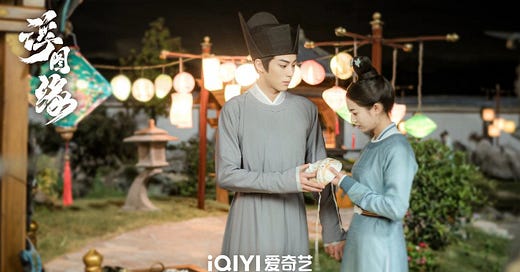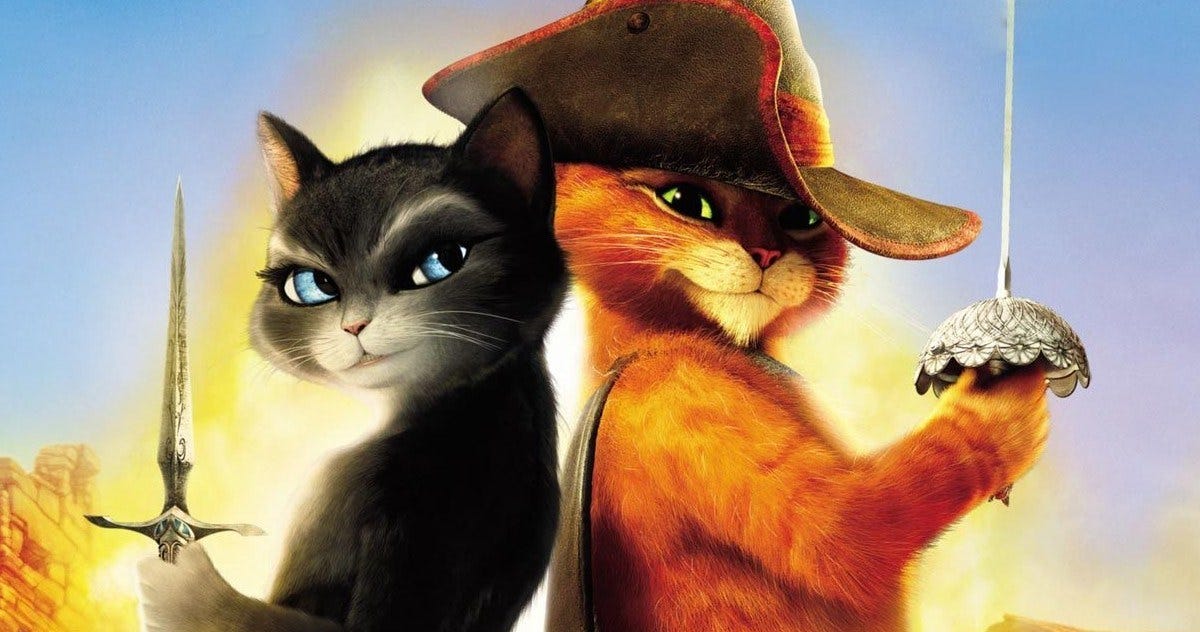Unchained Love (2023) The Pale Blue Eye (2022) Puss in Boots: The Last Wish (2022)
Chen Yuqi and Dylan Wang are delightful pairing as a imperial consort and eunuch respectively in this faux historical romantic comedy. It is a quirky mix of genres that don't always blend well especially in the final phase of the drama, where the show feels like it outstays its welcome. The show is at its best when it doesn’t take itself seriously and remain within its comedic purview.
The series starts off with plenty of hilarity as Chen Yuqi’s Bu Yinlou attempts to survive the rough and tumble of palace machinations using her wits. She’s an inveterate gambler and manages to get extricate herself from various problems sometimes with the aid of Dylan Wang’s Xiao Duo, a supposed eunuch in charge of Zhaoding Bureau and other law enforcement agencies. The leads are suspicious of one another’s intentions at first but later become allies and eventually lovers. The banter between them is a hoot especially when they misunderstand each other and there are many laugh out loud moments in those early days.
The pair inevitably find themselves in a love triangle with the recently crowned emperor Murong Gaogong (Peter Ho) whose obsession with Yinlou is… incomprehensible all throughout. He evolves from being a timid prince to a raving paranoid megalomaniac — a caricature rather than a fully fleshed out character. Even when he finally finds out that Yinlou and Xiao Duo are doing the hanky-panky behind his back, he reactions are insanely pathetic. He barely knows Yinlou except for a brief childhood encounter and yet he expends all his energies in obsessively holding on to her to the point of absurdity. As a result of not having his way with her, and suffering one disaster after another he spirals into self-destructive madness. Even though he suffers the fate of all cuckolds, there’s not a lot that’s sympathetic or likeable about him. Instead he is primed as a figure of scorn.
Where the show goes wobbly is when it tries to be serious and soapboxes about the freedom for individuals to choose within the palace walls. Theirs is a forbidden love but Yinlou seems an unlikely mouthpiece that speaks truth to power. The downside to this is that it takes one right out of the experience because let’s face it, nobody cares anything about individual freedom in the days of emperors. Luckily for them, the leads have the intelligence and enough friends to help them with Yinlou’s jail break. But by then, one has had a gutful of a very deranged monarch whose grasp on reality diminishes daily. Where would the opinionated leads be if they had no brains? Dead, would be one possibility. Or contentedly living out the rest of their lives in the palace eating and drinking from the emperor’s table just grateful for not being dead.
In some ways I’m surprised that this got made. Or that it even got past the scissor happy censorship with as much as it did. Many of the passionate scenes purportedly got the chop and yet when Yinlou slaps the emperor she gets away with it. Her statements railing against his tyranny are far more radical than all the snogging between the leads. Perhaps it’s the low budget nature of this beast. I can only speculate that those who let this pass think somehow that hardly any one will be watching this and an emperor who is over-the-top crazy can’t possibly have any modern day parallels.
All in all, it’s far more enjoyable when one suspends all manner of disbelief.
In one of my increasingly rare excursions away from Asian dramas, my oldest and I caught the historical film The Pale Blue Eye starring Christian Bale and a host of talented British and US actors. It was promoted on my Netflix feed as a whodunit set during the mid 1800s at West Point when Edgar Allan Poe was still a young man. Poe here is played by Harry Melling and Christian Bale is an older world-weary detective Augustus Langdon called in to investigate a series of strange deaths at the military academy. The genre is right up my wheelhouse and I’ve always liked Bale. As a murder mystery, the show is okay and even offers up a twist at the end. I note too that it has come under fire for its final act which I’m personally fine with because it was an outcome that I had already considered briefly. If there’s anything to criticize about the resolution is that too much is left to the last 10-15 minutes and it comes off clunky. As always Bale can be relied upon to deliver the goods but the revelation here is Harry Melling who I have some vague memory of in his stint in the Harry Potter franchise. The interactions between the two male leads are undoubtedly the highlight of the story.
My actual appreciation of the film however comes not so much whether it stacks up as a detective story *gasp* but the fact that it’s a self-conscious period piece. It projects a conscious historical authenticity that I don’t see very often these days especially in any kind of adaptation. The setting, the preoccupations, the characters and the dialogue (in particular) reflect a world and sensibility that may not be our own which makes it far more interesting. Their predicaments were different and the ways in which they thought about them and resolved them with whatever tools were at their disposal would be unique to their era. All of that is part of the charm of historical fiction. Which I miss. This is why I refused to darken the door of the most recent adaptation of Persuasion. The trailer was enough to portend horrors — and the female lead was unrecognizable as Jane Austen’s Anne Elliott. I don’t necessarily have an issue with making something a touch more accessible to modern audiences but there’s really no need to dumb down the material to the point where beloved characters are completely unrecognizable. Existing IPs may come with an in-built audience but can easily be a double-edged sword if expectations are unmet or if the showrunners don’t understand what made the source material popular in the first place.
An example of a superb update on an old story, however, is Dreamwork’s Puss in Boots: The Last Wish. I had heard good things about it in the comment sections and took the family to see it. The verdict? Great entertainment for the entire family. Well-developed character arcs based on beloved fairytales. Terrifying villains and wonderful themes about family that will have widespread appeal. It’s heartwarming and positive with more than a few laugh out loud moments.
Located in the Shrek universe, The Last Wish is about a Puss who has come to an end of his nine lives and is confronted with his own mortality when he cross swords with Death (a badass wolf) for the first time. The swashbuckling Puss loses his nerve and hangs up his boots for a quiet life of retirement in cat aged care. Soon the mafiaesque Goldilocks and the Three Bears come knocking hoping that he will help them “acquire” a map from Jack Horner that leads them to the land where The Last Wish will be granted to one who gets there first. This gives Puss the idea that if he were to get his paws on them first, he could reverse the trajectory that he’s on. During his stint in cat retirement home, Puss comes across a fake cat ie. therapy dog Perrito and against the former’s better judgment the two become travelling companions. Along the way Puss bumps into Kitty Softpaws an old flame and they play a serious game of oneupmanship until each realises the importance of teamwork.
Everything about it works. The animation is mindblowing, the voice actors (Antonio Banderas, Salma Hayek, Harvey Guillen, Florence Pugh) really bring their A game to this. But what makes it all hang together is the storytelling which has me cackling with laughter one minute and weepy in tears the next. It’s a glorious story that celebrates life, with all its limitations, to focus on what we have rather than be fixated with what we don’t. It’s also a smart script with an uplifting message and touches on all that we have in common no matter which part of the world we come from.





